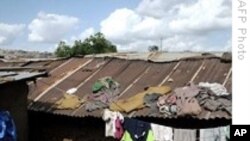It is World Habitat Day and an international aid agency is highlighting the plight of the hundreds of thousands of Africans that are left homeless every year because of forced evictions. Amnesty International is leading a worldwide campaign calling for African governments to bring an end to the unlawful practice.
The Britain-based aid group says it has documented forced evictions in 10 African countries. In Kenya in July it says about 3,000 people were evicted from their homes in a village just outside the capital Nairobi.
In Chad, Amnesty International says tens of thousands of people have been evicted from their homes in the capital N'Djamena since 2008.
The agency's Africa Program Director Erwin van der Borght says in Chad entire communities were knocked down.
"Not only were they evicted by force but also their houses were completely destroyed. And Amnesty International has been able to document that not only through research on the ground by speaking to the people affected but also by using satellite images to demonstrate how whole neighborhoods were destroyed," van der Borght said.
He says evictions can be brutal.
"Often during those forced evictions excessive use of force is being used by security forces, which also has resulted in a number of people wounded and sometimes even casualties - people who have died due to the forced evictions," he said.
Van der Borght says there are a number of reasons for widespread evictions. He says some governments use eviction as a political weapon to attack opposition politicians or supporters of rebel groups. At other times people are evicted so that areas can be developed or because of environmental issues.
He says the fast growth of urban areas in many African countries makes the situation worse.
"Increasingly people are living in urban centers in big cities. They are often living in informal settlements or slums where there are very precarious circumstances. They often have no security with regard to how long they can stay there - they always have a feeling of being at risk of forced evictions," said van der Borght.
He says whatever the cause, the nature of the evictions are often the same, little warning and no compensation.
He says this is a violation of regional and international law, including rules laid down by the African Charter on Human and People's Rights.
"The governments have voluntarily agreed to respect these human rights by signing up to those regional and international treaties so there is a responsibility to respect their commitments," said van der Borght.
The United Nations has designated the first Monday of October every year as World Habitat Day. The day is used to highlight the need for adequate shelter across the globe.
News
Unlawful Evictions Across Africa says Aid Agency
update

<!-- IMAGE -->



